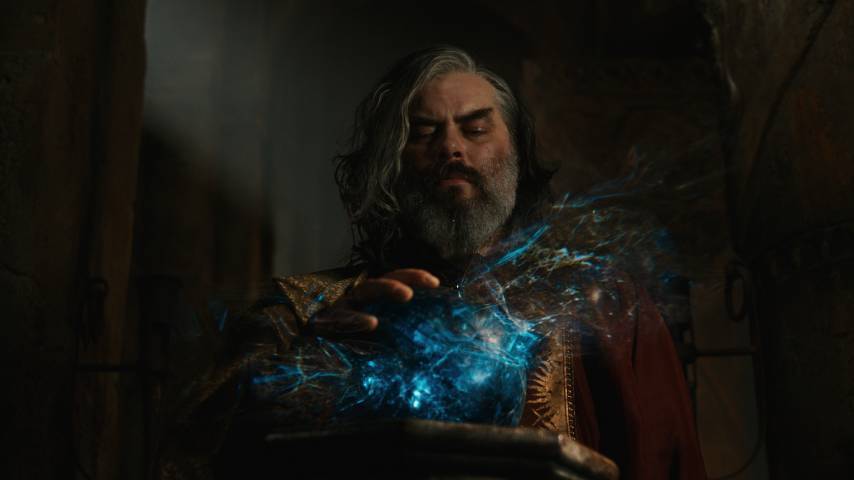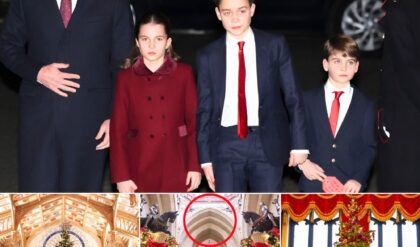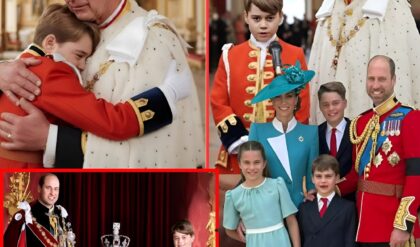Middle-earth’s kingdoms have been poisoned by Sauron, and he’s more than willing to sit back and watch it all play out
Celebrimbor is lost in the sauce. Weeks into his Rings for Men project, he can’t even remember the names of the nameless Elves we only met in the last episode. Her asking, “You don’t remember my name?” was a pointed insult at the Rings Of Power faithful, who were more than willing to learn her name had anyone introduced us! Celebrimbor and Mirdania’s (Amelia Kenworthy) discombobulation is a symptom of the upheaval traveling throughout Middle-earth. Everyone, even those who supposedly know Sauron best and who have killed him before, is missing the forest for the trees. The path may be split in two, but most choose to walk into Sauron’s trap.
For now, the problem is generational. Savvy Sauron dug his claws into party elders—your King Durins, your Lord Celembrimbors, your Ar-Pharazôns. They’re fools to do his dirty work (oh yeah), and it’s going over gangbusters with the Dark Lord. Whether it’s the endless pursuit of gold or feeding your political opponents to a giant cephalopod known as the Sea-worm, these rulers weaponize their standing to fit Sauron’s needs. And it’s not just the Valar’s creations turning on their leaders. In our mid-season check-in with Arondir, we overhear two Orcs—apologies, two Uruk—complaining about Adar, whom they characterize as chasing ghosts (presumably Sauron). Even among the Orcs, Middle-earth’s current leadership is overstaying its welcome.
Unfortunately, like so many septuagenarian politicians, King Durin refuses to retire, and like so many children of septuagenarians, Prince Durin can’t convince him to hang up the crown. In one of several scenes that remind us why we love this couple, Disa and Durin hash out why it’s so important to stand up to their elders and how they’ll have to step up their mountain defenses. The loveliest thing about these two is how normal and human their relationship appears despite being cave-dwelling Dwarves. There’s so much respect for each other, how they wish to proceed, and the mutual understanding that they want to find a solution. They listen to each other, a rarity in fantasy shows about palace intrigue. Plus, Disa has bat-summoning powers now.
Yet King Durin is more far gone than Durin knows. The Elves are running low on mithril and need the Dwarves to replenish their supply. Regrettably, in addition to bolstering the King’s shaft-hunting skills, the King’s shrewdness is at an all-time high, too. He’s not handing over mithril for some timber. When the great war breaks out, the army with the mithril will have the advantage. Then, the Ring—er, Khazad-dûm—can name its price.
While King Durin readies his haggling hands, Adar sits across the negotiating table from Galadriel. With the lit candles, a more debonair and less internally pained Adar attempts to woo Galadriel with a proposition. You see, they’re not so different, him and her. Having both been burned by Sauron, Adar attempts to persuade Lady Galadriel to relate to him and the Orcs because Sauron would fall if the Orcs and Elves partner.
He makes a compelling case. Adar has always been a more sensitive character than Galadriel. Elves are not very reactive characters, and this is probably one of many things making this show difficult for audiences to connect with. It’s like hanging out with a bunch of nature-loving robot priests. But as a corrupted Orc, Adar is more in touch with himself and has no problems accessing a well of nuanced emotions. It’s perhaps why he beautifully articulates how Sauron “sees” his victims and who they wish to be. “An ocean of color against which everything else feels forever a dull gray.”
Adar offers an olive branch to prove his sincerity: Morgoth’s crown, the chapeau Adar used to slay Sauron in the First Age. It’s a big offer; to explain, we’ll have to crack open The Silmarillion.
In the First Age, the Two Trees of Valinor gave light to the world like the sun and moon. Celebrimbor’s grandfather, Fëanor, harnessed their light in three gems known as the Silmarils. In an attempt to take over the world, the Dark Lord Morgoth had his giant spider friend Ungoliant suck the light from the trees, making the Silmarils the only vestiges of the Trees’ light. Then Morgoth stole those, too, and stuck them in his crown. The War of the Jewels results in Morgoth’s death, the end of the First Age, and Adar’s betrayal of Sauron this season.
Adar’s thought makes sense. The Silmarils will be but a whisper compared to the Rings of Power, and having Morgoth’s crown with three Rings should be enough to defeat Sauron. But Galadriel finally sees what’s going on. Adar is falling into Sauron’s trap. Sauron wants Adar to lead the Orc army to Eregion, where he’ll usurp Orc daddy, presumably. If he can keep Celebrimbor working a little longer, he’ll have the Nine, too.
There don’t seem to be many good answers, as Nori and The Stranger also learn. If they reunite, it could mean almost certain doom for the Harfoots and the world. As he often does now, Tom Bombadil lays it all out for Gandalf in a very Star Wars fashion. Choose he must, between saving his friends or finishing his Wizard training, e.g., Nori or his staff in Bombdil’s twisted desert garden. Conversely, if Nori goes after The Stranger, she could attract attention to the Stoors, where Poppy has already begun laying down roots with Merrimac.
This version of Tom can be so frustrating. I want to be mad at the show for being so straightforward in his exposition, yet there’s part of Rory Kinnear’s performance that leads me to believe he’s just screwing with The Stranger a little bit. He’s telling him what he needs to hear more than what he’s supposed to do. Does he care about Sauron, or is he just messing with The Stranger? It’s hard to tell. What’s worse: turning Tom Bombadil into a plot cog or introducing a staff garden and not doing anything with it? Sometimes this show is cruel in how it delineates screen time.
At least Elendil had more to do this week. Now sentenced to death by Pharazôn, Elendil is experiencing the joys of parenthood, with him and Eärien mirroring the Durins. Eärien believes her father is consumed by pride. He’s not. He’s consumed by faith, becoming one of television’s most likable religious zealots, resolving to leave his fate to the Valar. However, Míril’s faith is shaken. This was a big moment for Cynthia Addai-Robinson, allowing the vale to fall. Since season one, she’s been exuding this divine sense of duty, ever loyal to the Faithful’s beliefs. Just a few weeks ago, she told Elendil to be outwardly deferential to Pharazôn to keep some faith in court. Here, she’s finding obscure technicalities to take Elendil’s place.
With her faith restored, Míril faces the Sea-worm head-on, and the Valar deems her—gasp—innocent! (As Lord Belzagar, Will Keen had some choice line deliveries.) Elendil declares her the queen, presumably shoving Númenor back into a constitutional crisis. Afterward, Pharazôn retires to his Palantir to seethe and look at footage of Halbrand. Is he planning on using his connection to Míril to win back the throne? Whose royal subjects are more exhausted, the Númenóreans or the free folk of King’s Landing?
Honestly, it’s all good for Sauron. He has them all looking the wrong way. As long as Númenor is in political disarray, it will delay whatever aid they can send the Elves. He’s got a fresh batch of mithril ore for Celebrimbor, who remains trapped in Sauron’s projections, showing him what he wants and wants to be. King Durin, too focused on the mines he has yet to delve into, doesn’t even know he has a Balrog problem. But Sauron does. Whispers in the dark are only getting louder.
Stray observations
• Míril’s meeting with the Sea-worm was very Avatar: The Way Of Water. I half expected Míril to ask about the Sea-worm’s family.
• I’m not a massive fan of Tom Bombadil quoting Gandalf or, really, any character quoting famous lines in a prequel. I had a similar issue with Alien: Romulus. Why can’t characters have their own lines anymore?
• This doesn’t count for Gollum quotes because everyone knows that Rings of Power only know a few words.
• That said, I love Peter Mullen’s King Durin and his sing-songy delivery of “It belongs to me.”
• Durin has the correct response to finding out your wife has bat powers.
• Disa’s bat-summoning abilities are the type of fantastical powers that we don’t see enough on serialized television.
• The United States should consider doing elections via Sea-worm.
• The mithril ore came out of nowhere. Should we assume Sauron went to the Balrog’s office after meeting with Durin, or was that Balrog tease just Sauron sensing it?
• The Silmarils will be but a whisper. Sauron is right about this. I think the Silmarils are mentioned only once or twice in the trilogy. Maybe in the Appendices?
• I loved this exchange between Adar and Galadriel: “But sooner or later he sees you, not just who you are but who you wish to be. His eye bores a hole, and the rest of him slithers in. For a while, he even makes you believe that his power has even become yours. Irresistible power that makes every desire’s fulfillment seem inevitable. An ocean of color against which where everything else feels forever thereafter—”
“A dull gray.”
• I know Elves, and Celebrimbor especially, are known for being these all-knowing beings that remember everything, but it seems unreasonable to believe they never have a simple brain fart. It’s so rude of Mirdania to come at him like that. The guy is making Rings for Men! Do you have any idea what kind of stress he’s under?





